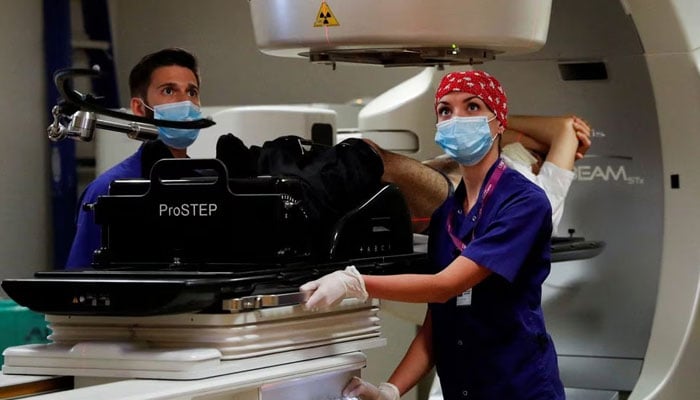'Some bowel cancer patients may do better without radiotherapy'
Study was conducted in New York on 1,194 patients suffering from rectal cancer
June 05, 2023

A new study revealed Sunday that people who go under radiotherapy for their bowel cancer can live better off without the therapy and can rely on surgery and chemotherapy for treatment of their disease.
There are several side-effects of radiotherapy, such as infertility, the need for a temporary colostomy, diarrhoea, cramping and bladder problems as it has been used for the treatment.
The research was presented at the annual meeting of the American Society of Clinical Oncology (ASCO), in Chicago and the results were also simultaneously published in the New England Journal of Medicine and the Journal of Clinical Oncology.
ASCO announced in a briefing paper that "omitting radiation therapy can reduce short- and long-term side-effects that impact the quality of life while providing similar outcomes in disease-free survival and overall survival."
The study was conducted in New York on 1,194 patients suffering from rectal cancer.
"They were divided randomly into two groups; One received the treatment with radiation followed by surgery, and then, chemotherapy at their doctor’s discretion; the other received the experimental treatment, in which participants were given chemotherapy first, followed by surgery. At their doctor’s discretion, another round of chemotherapy could be given."
The findings suggested that Radiotherapy did not improve outcomes and after 18 months, in the quality of life of the two groups, no difference was seen. Moreover, there was similar survival between them.
Toxic therapies
Dr Pamela Kunz, an ASCO expert, not involved with the study, said: "We've reached a tipping point. As we develop new therapies, we are also exploring where we can eliminate toxic therapies for our patients’ wellbeing.
"The findings of this study allow us to do just that, showing we can omit radiation therapy for some patients, improving quality of life without compromising efficacy."
For eight years, the trials will be monitoring the participants for additional data collection about survival, recurrence and other endpoints.
"This is really a case of less is more. The study shows that we can spare select patients from receiving radiation. This leads to improved quality of life and reduced side-effects including things like early menopause and infertility. This trial is practice-changing," noted Kunz.
Charles Swanton, Cancer Research UK's chief clinician, said doctors around the world were increasingly trying to find ways to reduce drug or radiation exposure to limit the long-term side effects for patients.
"Pelvic radiotherapy is associated with major long-term side-effects. I think avoiding radiation is a major step forward," adding that the research was "pretty solid”.
"On the basis of this, I think you can say you can safely avoid radiotherapy for many patients with this disease. I think it’s definitely an advance."









